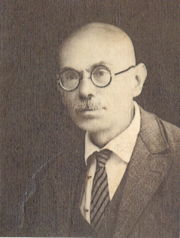|
|
Otto
Alscher was born January 8 1880 in Perlas/Perlasz
along the Tisza River, Banat, then
Hungary, † December 29th 1944 in
Targu Jiu, Romania).
Lived
in Orschowa 18912 He is mentioned
in literary history as "a German
poet of Hungary"
and "Romanian-German
and Austrian writers. Editor
of the "Deutdschen
Tageblatts.
  |
For a brief
period from
1919 to
1922, Otto
Alscher
lived in
Temesvar,
the capital
of Romania
Banat, and
found a new
sphere of
activity in
Banat
Journalism
and cultural
politics.
As
contributor
to the
Deutsche
Wacht
(Subsequently
Banater
Tagblatt)
and the
Deutsche
Tagespost in
Hermannstadt,
and from
1921 as
co-editor,
together
with his
colleague
from
Belgrade and
Budapest
days,
Franz Xaver
Kappus,
of the
Schwabische
Volkspresse
and the
monthly
Illustrieter
Weltspiegel,
he championed
the rights
of Banat
Germans and
strove to
foster
cultural
activity
among them.
Now that the
Banat was
cut off from
literary
developments
in the wider
German-speaking
world, he
sought to
cultivate
cultural
links with
Austria and
Germany by
discussing
German
novels,
plays and
art, and
supporting
theatre
productions,
translations,
readings and
lectures.
This phase
of his life
ended in
withdrawal
to his
smallholding
in Orschowa
in 1922. For
several
years his
only writing
appear to
have
consisted of
sporadic
contributions
to the
Lugoscher
Zeitung,
which was
edited by
his friend
Heinrich
Anwender.
In the
second have
of the
1920’s he
published a
series of
stories in
the
Kronstadter
Zeitung, and
his Munich
publisher
Albert
Langen
bought out a
new volume,
stripped of
the
philosophizing
and
emotional
excesses of
his early
writing,
under the
title Tier
and Mensch.3
The final
twist in
Alscher’s
fortunes
came in the
Autumn of
1944. When
the Romanian
dictator Ion
Antonescu
was toppled
and the
country
transferred
its support
from Hitler
to Stalin,
he was
interned
together
with many of
his
countrymen.
He died from
the results
of
malnutrition
and
infection in
December
1944, aged
sixty four.
Few traces
of Alscher’s
life remain:
the house in
which he
grew up in
Orschowa
disappeared
when the old
town was
submerged by
the waters
of a dam
built in the
early 1970s,
his forest
home outside
of town has
been
demolished,
and his body
lies in an
unmarked
grave near
the camp in
Tirgu Jiu.3
Source:
German
Monitor
Fractured
Biographies,
Edited by
Ian Wallace;
Publication:
1994,
printed in
the
Netherlands.
A Life Among
Gypsies and
Wolves: Otto
Alscher’s
Quest For An
Alternative
to Modern
Civilization
written by
Axel
Goodbody.
Paperback:
257 pages;
Publisher:
Rodopi
(November
2003);
Language:
English;
ISBN-10:
904200956X ;
ISBN-13:
978-9042009561
Additional
reading:
Goodbody,
A.H. (http://opus.bath.ac.uk/view/person_id/41.html),
2007.
The
Hunter
as
Nature-Lover:
Idyll,
aggression
and
ecology
in
the
German
animal
stories
of
Otto
Alscher.
In:
Gifford,
T.
and
Beckett,
F.,
eds.
Culture,
Creativity
and
Environment:
New
Environmentalist
Criticism.
Amsterdam:
Rodopi,
135--159.
Published
by
Jody
McKim
Pharr,
DVHH.org
10
Nov
2009.
Poetry
Der Dukaten" Der Türk stürmt





